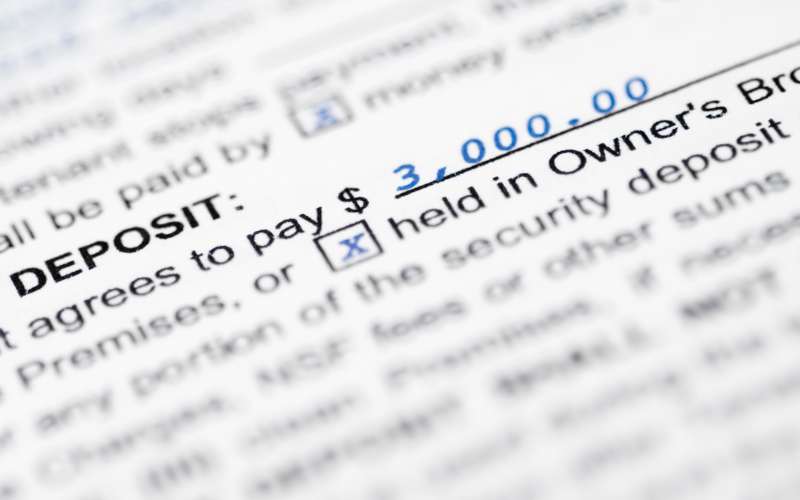Last Updated on March 18, 2024 by Kelvin Nielsen
If you’re a tenant or landlord in Delaware, it’s important to understand the state’s security deposit laws. These laws regulate how much landlords can charge for a security deposit, whether tenants’ security deposits earn interest, and what can make a landlord make deductions to a tenant’s security deposit.
Additionally, these laws specify how long landlords have to return a tenant’s security deposit and what happens if they sell their rental property.

As a tenant in Delaware, you should know that landlords can charge a maximum of one month’s rent for a security deposit. If you’re renting a property for one year or more, your landlord can’t charge you more than this amount.
Additionally, landlords are required to return your security deposit within 20 days of the end of your lease. If they don’t, they may be required to pay you double the amount of your deposit.
If you’re a landlord in Delaware, you should know that you can make deductions to a tenant’s security deposit for unpaid rent, damages beyond normal wear and tear, and other specified reasons.
However, you must provide your tenant with an itemized list of the deductions you’re making and the reasons for them. Additionally, you can’t make deductions for normal wear and tear.
Key Takeaways
- Landlords in Delaware can charge a maximum of one month’s rent for a security deposit.
- Tenants’ security deposits in Delaware may earn interest.
- Landlords in Delaware can make deductions to a tenant’s security deposit for specified reasons, but must provide an itemized list of deductions.
Related Posts:
- Report Your Landlord in Delaware
- Can a Landlord Enter Without Permission in Delaware?
- What Rights Do Tenants Have in Delaware?
- What a Landlord Cannot Do in Delaware
- Is Delaware a Landlord-Friendly State?
How Much Security Deposit Can Landlords Charge in Delaware?
In Delaware, landlords can charge a maximum of one month’s rent as a security deposit. This limit applies to leases that have a term of one year or longer.
However, there are exceptions to this rule. For example, if the lease term is shorter than one year, there is no limit on how much a landlord can charge for a security deposit. Additionally, different security deposit limits apply for federally-assisted housing programs.
It is important to note that landlords cannot charge tenants for normal wear and tear to the property. They can only deduct from the security deposit for damages that exceed normal wear and tear.
De Tenants’ Security Deposits Earn Interest in Delaware?
If you are a tenant in Delaware, you may wonder if your security deposit earns interest. According to Delaware law, landlords are not required to pay interest on security deposits. However, they must hold the deposit in a separate account and return it to the tenant with any accrued interest at the end of the lease term.
Landlords must also provide tenants with a written notice of the name and address of the financial institution where the security deposit is held. This notice must be given within 20 days of receiving the deposit. If the landlord fails to provide this notice, the tenant may be entitled to the return of the deposit plus interest.
It is important to note that the landlord may deduct a reasonable amount from the security deposit for unpaid rent, damages, or other charges outlined in the lease agreement. However, deductions must be itemized and accompanied by receipts or other documentation. If the landlord fails to provide an itemized list of deductions, the tenant may be entitled to the return of the full deposit plus interest.
In summary, Delaware law does not require landlords to pay interest on security deposits, but they must hold the deposit in a separate account and provide tenants with a written notice of the financial institution where the deposit is held.
Deductions from the deposit must be itemized and accompanied by documentation, and failure to comply with these requirements may result in the return of the full deposit plus interest.
What Can Make a Landlord Make Deductions to a Tenant’s Security Deposit?

If you are a tenant in Delaware, your landlord can deduct from your security deposit for any unpaid rent or damage to the rental unit that occurs because of abuse or negligence by you. However, normal wear and tear is not deducted from the security deposit.
Difference between Damage And Normal Wear and Tear
Damage is any destruction to the rental unit due to abuse or negligence by the tenant. Examples include heavily stained, burned, or torn carpets, stained bath fixtures, or broken windows. On the other hand, normal wear and tear is the expected deterioration of the rental unit over time due to ordinary use. Examples include faded paint, worn carpet, or small nail holes in the wall.
It is important to note that if the tenant leaves the rental unit in the same condition as when they moved in, except for normal wear and tear, then the landlord cannot deduct any amount from the security deposit. Therefore, it is recommended to document the condition of the rental unit before moving in and after moving out.
In summary, landlords in Delaware can only make deductions from security deposits for unpaid rent and damage caused by the tenant. Normal wear and tear is not deducted from the security deposit.
It is recommended for tenants to document the condition of the rental unit before moving in and after moving out to avoid any disputes with the landlord.
How Long Do Landlords Have to Return a Tenant’s Security Deposit in Delaware?

In Delaware, landlords must return a tenant’s security deposit within 20 days of the termination of the lease or the tenant’s move-out date, whichever is later. If the landlord withholds any portion of the security deposit, they must provide the tenant with an itemized list of deductions within the same 20-day timeframe.
It’s important to note that Delaware law does not specify whether weekends and holidays are included in the 20-day timeframe. However, landlords should aim to return the security deposit as soon as possible to avoid any potential legal issues.
If the landlord fails to return the security deposit within the 20-day timeframe, the tenant can take legal action. The tenant may be entitled to double the amount of the wrongfully withheld security deposit, plus reasonable attorney’s fees and court costs.
To avoid any misunderstandings or legal issues, landlords should clearly communicate the terms of the security deposit to tenants in the lease agreement. This includes the amount of the security deposit, the conditions for withholding the deposit, and the timeframe for returning the deposit.
Related Posts:
- Can You Withhold Rent in Delaware? A Guide to Tenant Rights
- Can You Break Your Lease Early in Delaware? A Guide to Lease Termination
- Can a Landlord Break a Lease in Delaware?
What Happens If Landlord Sells Their Rental Property
If your landlord decides to sell the rental property you are living in, you may be wondering what happens to your security deposit. According to Delaware security deposit laws, the landlord must return your security deposit within 20 days of the lease termination or expiration.
However, if the property is sold, the new owner becomes responsible for the security deposit. The former landlord must transfer the security deposit to the new owner within 30 days of the sale. The new owner must then notify you in writing of the transfer and provide you with their contact information.
If the former landlord fails to transfer the security deposit to the new owner, you can file a claim against them in court. If the new owner fails to return your security deposit, you can also file a claim against them in court. In either case, you may be entitled to double the amount of the security deposit that was wrongfully withheld.
In summary, if your landlord sells the rental property you are living in, the new owner becomes responsible for returning your security deposit. If either the former landlord or the new owner fails to return your security deposit, you may be entitled to double the amount that was wrongfully withheld.
Rights and Responsibilities
Landlord’s Obligations
As a landlord in Delaware, you have certain obligations when it comes to security deposits. You may require a security deposit, but you cannot require a deposit that is greater than one month’s rent if the rental agreement is for one year or more.
You must provide a written receipt for the deposit and a written list of any existing damages to the rental unit. You must also return the deposit within 20 days of the termination of the lease.
Tenant’s Rights
As a tenant in Delaware, you have certain rights when it comes to security deposits. You have the right to receive a written receipt for the deposit and a written list of any existing damages to the rental unit. You also have the right to receive the deposit back within 20 days of the termination of the lease. You may dispute any deductions made from the deposit.
Dispute Resolution and Penalties
If there is a dispute regarding the security deposit, either party may file a complaint with the Justice of the Peace Court. If the court finds that the landlord wrongfully withheld the deposit, the landlord may be liable for double the amount of the deposit, plus reasonable attorney’s fees.
If the tenant wrongfully withheld the rental payment, the landlord may withhold the entire deposit to cover unpaid rent.
Disclosure: The content herein isn’t a substitute for advice from a professional attorney. It’s only meant to serve educational purposes. If you have a specific question, kindly seek expert attorney services.
Sources: CHAPTER 53. Landlord Obligations and Tenant Remedies, Residential Landlord-Tenant Code, § 5514. Security deposit,

Amanda Rose is a seasoned landlord with 13+ years of expertise in overseeing diverse properties. Her adept management spans single and family homes, along with multi-family apartments and condos, across Wyoming and South Dakota. Her commitment and proficiency have cemented her status as a thriving property management professional.
She is a member of the following organizations: Wyoming Landlord’s Association, National Association of Residential Property Managers (NARPM), Wyoming Apartment Association, South Dakota Multi-Housing Association (SDMHA), and South Dakota Landlord Association (SDLA).







